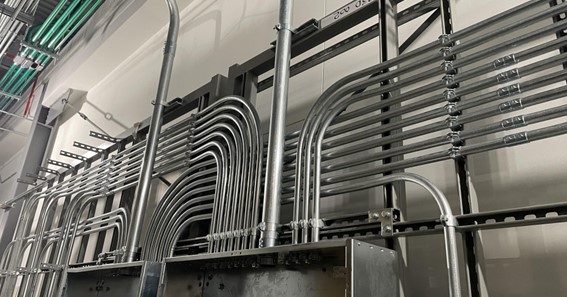Are you curious to know what is IMC conduit? You have come to the right place as I am going to tell you everything about IMC conduit in a very simple explanation. Without further discussion let’s begin to know what is IMC conduit?
In electrical installations, a reliable conduit system is essential to ensure the safe and efficient routing of electrical wiring. IMC (Intermediate Metal Conduit) is a popular choice among electrical professionals for its strength, durability, and versatility. IMC conduit provides a protective pathway for electrical cables, safeguarding them from damage and offering ease of installation. In this blog, we will explore the concept of IMC conduit, its features, benefits, and its importance in electrical infrastructure.
What Is IMC Conduit?
IMC conduit is a type of rigid electrical conduit designed to protect and encase electrical wiring in various applications. It is constructed using a thick, galvanized steel material, providing superior strength and resistance against corrosion. IMC conduit is available in standard trade sizes and lengths and is compatible with a wide range of fittings and connectors, making it versatile for different installation requirements.
Features And Benefits Of IMC Conduit:
- Strength and Durability: IMC conduit is known for its high tensile strength and durability. Its robust construction ensures protection against physical impact, environmental factors, and other potential hazards, making it suitable for both indoor and outdoor applications.
- Corrosion Resistance: The galvanized coating on IMC conduit provides excellent corrosion resistance, protecting the conduit from moisture, chemicals, and other corrosive elements. This feature enhances the longevity of the conduit and ensures its performance in diverse environments.
- Easy Installation: IMC conduit is designed for ease of installation. Its lightweight yet sturdy nature allows for convenient handling and maneuverability during the installation process. The smooth interior surface of the conduit also facilitates the smooth pulling of electrical cables.
- Compatibility: IMC conduit is compatible with a wide range of fittings, connectors, and accessories, offering flexibility in design and installation. It can be easily connected to junction boxes, enclosures, and other conduit runs, providing a seamless conduit system.
- Electrical Protection: IMC conduit offers reliable electrical protection by enclosing and shielding electrical cables from potential damage. It safeguards against accidental contact, moisture, dust, and other external elements, ensuring the safety and integrity of the electrical wiring system.
- Code Compliance: IMC conduit meets rigorous safety standards and code requirements established by regulatory bodies. Its use in electrical installations ensures compliance with local electrical codes, enhancing safety and minimizing risks associated with improper wiring practices.
Applications Of IMC Conduit:
IMC conduit finds applications in various industries and environments, including:
- Commercial and Industrial Buildings: IMC conduit is commonly used in commercial and industrial buildings, such as offices, factories, warehouses, and shopping malls, where robust electrical protection is necessary.
- Outdoor Installations: The corrosion resistance of IMC conduit makes it suitable for outdoor installations, including lighting systems, parking lots, and outdoor equipment connections.
- Hazardous Locations: IMC conduit is also used in hazardous locations where there is a risk of flammable gases or combustible dust. The strength and durability of IMC provide added safety in such environments.
Conclusion:
IMC conduit serves as a reliable solution for electrical conduit systems, offering strength, durability, and versatility. Its robust construction, corrosion resistance, and compatibility with various fittings make it a preferred choice for electrical professionals. IMC conduit provides the necessary protection to electrical wiring, ensuring safety, reliability, and compliance with electrical codes. Whether in commercial, industrial, or outdoor settings, IMC conduit plays a vital role in creating a secure and efficient electrical infrastructure.
Let’s find out more facts about interesting topics on Turnonx
FAQ
What Is The Difference Between Emt And IMC Conduit?
Electrical metallic tubing (EMT): Lightweight and easy to install. Intermediate metallic conduit (IMC): Has a thicker, galvanized wall, making it suitable for outdoor applications. Galvanized rigid conduit (GRC), which is thickest and offers the most protection.
What Is The Difference Between IMC And Rigid Conduit?
IMC is manufactured as a cross between EMT and rigid metal conduit (RMC). A slightly thinner gauge than RMC, IMC is light but strong. It has the same electric-resistance welded tube-making process as EMT, but it is threaded like RMC, so the same couplings can be used for both.
Is IMC Thicker Than Emt?
As implied by its name, IMC is the intermediate option, thicker than EMT but thinner than RMC.
Where Is IMC Conduit Used?
Yes, IMC can be installed in concrete, in direct contact with the earth, or in areas subject to severe corrosive influences where protected by corrosion protection (IMC is provided with corrosion protection per UL-1242) and judged suitable for the condition.
I Have Covered All The Following Queries And Topics In The Above Article
What Is IMC Conduit Made Of
What Is IMC Electrical Conduit
What Is IMC In Electrical Conduit
Electrical Conduit What Is IMC Sweep?
IMC Vs Emt Conduit
Is IMC Conduit Aluminum
IMC Vs Rigid
Grc Conduit
1″ IMC Conduit
1/2 IMC Conduit
Intermediate Metal Conduit Uses
IMC Conduit Fittings
What Is IMC Conduit
What is the difference between IMC and EMT conduit
What is IMC electrical conduit?
